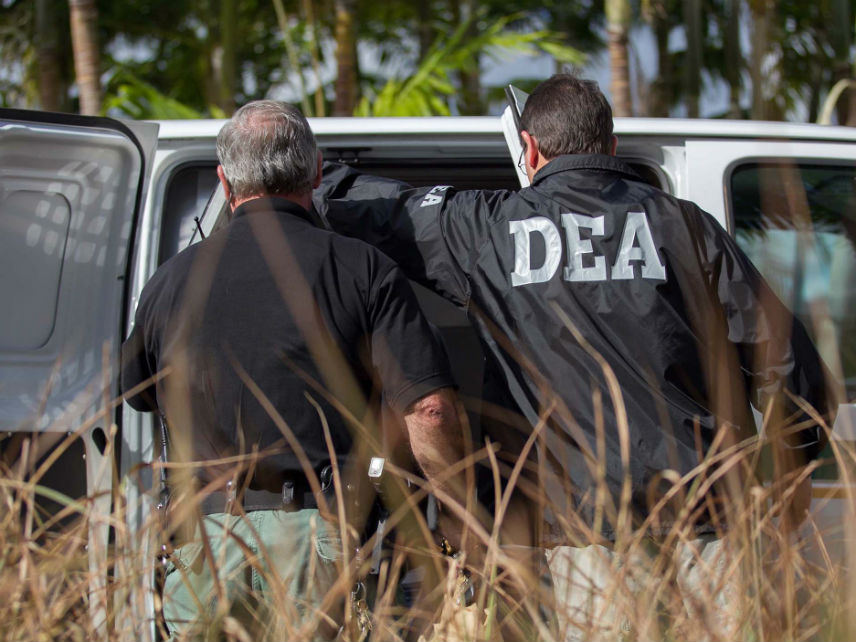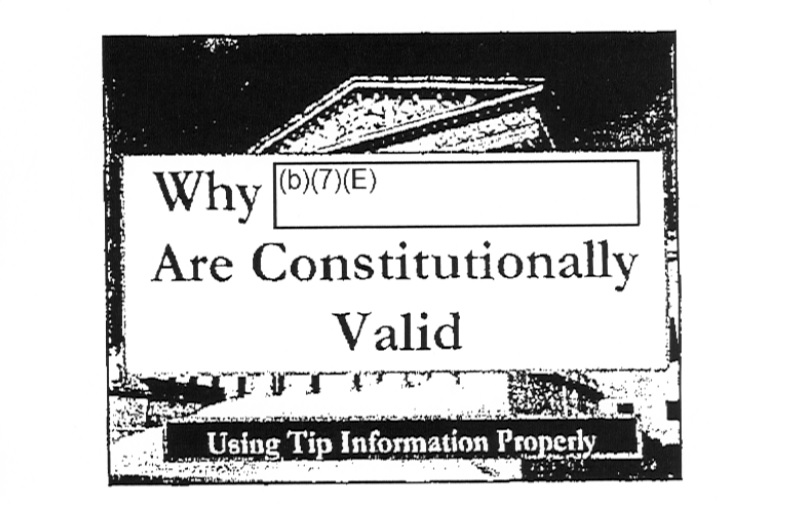Federal Agencies May Be Regularly Hiding Surveillance Methods in Criminal Cases
"This use of secret evidence may be occurring regularly in cases throughout the country."

The U.S. government uses secret evidence to build criminal cases, according to a report released today by Human Rights Watch.
The report offers one of the most comprehensive looks yet at "parallel construction," a tactic where federal law enforcement hides classified or sensitive methods from courts by building a parallel chain of evidence after the fact.
The report shows that numerous federal law enforcement agencies send requests to local police to find reasons to perform traffic stops and searches on criminal suspects. Unless something goes wrong, defendants will never know the origins of the government's case against them.
Although it's difficult to find cases where parallel construction definitively occurred, the investigation "nevertheless indicates that this use of secret evidence may be occurring regularly in cases throughout the country—cases in which the person accused of an offense remains innocent until proven guilty and faces a potentially life-altering prison term."
The group notes that parallel construction raises several civil rights concerns, chiefly the right to a fair trial.
"When you have parallel construction, you have defendants and even judges who don't know how evidence was gathered and can't challenge the constitutionality of that," report author Sarah St. Vincent says. "What you have is very one-sided, where the government, on its own, is deciding what practices it thinks are legal."
St. Vincent says parallel construction could hide illegal searches that violate defendants' Fourth Amendment Rights, or that result in exculpatory evidence not being turned over, violating the Fifth Amendment. It could also be used to hide discriminatory actions by law enforcement.
The method was first revealed in a 2013 Reuters investigation, which detailed how the Special Operations Division, a secretive unit within the Drug Enforcement Administration (DEA), had been funneling surveillance tips to field agents and other agencies to build cases. Meanwhile, it trained agents to "recreate" evidence chains to keep classified methods hidden from defendants, judges, and even federal prosecutors.
According to the Human Rights Watch report, the Special Operations Division's activities were nicknamed "the dark side" and exiting agents were given Darth Vader keychains as tokens.
DEA training slides that I obtained via a 2014 Freedom of Information Act request shed further light on how widespread the tactic is. The FOIA request also resulted in perhaps my favorite redaction that I have ever received:

Although mass surveillance is usually identified with the war on terror and the National Security Agency, a subsequent USA Today investigation found the DEA and Justice Department had been collecting logs of billions of phone calls originating from the U.S. in a program that predated 9/11 by more than a decade.
Human Rights Watch found "numerous" federal and state judicial decisions where the government admitted after the fact to carrying out what are known as "whisper," "wall," "walled off," or "wall off" stops.
In such stops, federal law enforcement sends tips to local police to be on the lookout for a certain vehicle at a certain time. Local police then follow the suspect's car until it performs some traffic violation, allowing the officer to legally perform a stop and establish probable cause for a search.
The Human Rights Watch report cites one case, Arizona v. Wakil, where a "whisper stop" requested by the DEA was used to conceal the agency's warrantless use of a GPS tracker on the defendant's rental car. An Arizona judge overturned the defendant's conviction in state court only after evidence of the whisper stop emerged in federal court.
Although much of the investigative reporting on parallel construction has focused on the DEA, Human Rights Watch's investigation found ATF, DHS, and the FBI had all requested such stops by local police.
The report recommends that Congress pass laws requiring the government to disclose to defendants the origins of the investigations of their cases, which would amount to a ban on parallel construction altogether.
In a January 2 article for Reason, Sen. Rand Paul (R-Ky.) also called for banning parallel construction.
"[T]he government should be disallowed from taking that information and developing a parallel construction of a case, where the illegally obtained information is not used in court but is used by law enforcement to develop other information to mount a prosecution," Paul wrote. "Our Founders gave us the Fourth Amendment to prevent a tyrannical government from invading our privacy, and we are fools to relinquish that hard-won right because of fear."
Such a bill would undoubtedly face opposition from federal law enforcement, especially at the Justice Department, where Attorney General Jeff Sessions has made escalating the drug war a top priority.
"Does it bother me a little? Yeah," a former federal prosecutor, speaking anonymously, tells Human Rights Watch in the report. "But if it's gonna stop 100 keys [kilograms of drugs] from getting on the street, it's okay by me. I didn't make the rules. I just play by them." It's not a very fair game, though, if only one side knows the rules.
Because of its very nature, it's almost impossible to know often parallel construction is used.
"The problem with researching a coverup," St. Vincent says, "is you're not supposed to know what happened."


Show Comments (38)